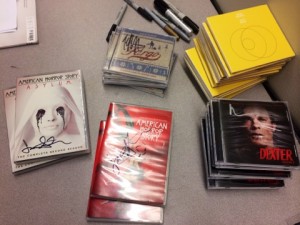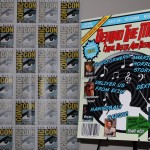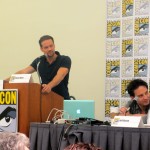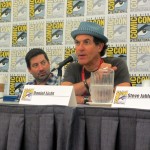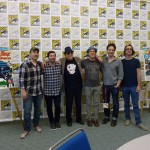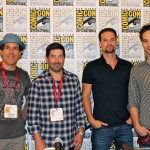Kristen started her day at the Behind The Music: Crime, Death and Resurrection panel where music composers talked about what it’s like writing music for major TV and movies that might drive a chill up your spine. Moderator Shane West, a musician himself, asked some great questions that attempted to get at what it’s like to have a career in scoring music. The panelists discussed the differences between composing scores and being in a more traditional band with Jeff Russo of the band Tonic, noting that weaving music in and out of lyrics is similar to weaving music in and out of dialogue in a scene. Christopher Young, a professor at USC and the guy responsible for scores from Deliver Us From Evil and Spider-Man 3, attempted to give advice for breaking into the field, but the general consensus on the panel seemed to be that it was a “right place, right time” kind of job. While a few panelists remained mum on what was next for them (apparently the video game industry keeps them tight-lipped), the panel certainly gave the audience a new appreciation for the music behind the scene.
After the panel, Kristen and Chelsea headed to the press room to speak with some of the panelists a bit further. Jeff Russo went into more detail about his work on Fargo explaining how you might create music for a show with characters who aren’t necessarily good or evil. He doesn’t want the music to be emotionally manipulative when it comes to the characters. Instead, he focused on creating music that went more with the backdrop of grand, picturesque landscapes and often seemed to contradict the intense violence on the screen. Russo also mentioned the duality in his life of being a guitarist in a band (Tonic) and a film composer. Although they both involve creating music, the infrastructure of the two industries differ enough that it can feel like he is two different people.
Continuing to delve into the psyche of the score composer, Christopher Young piqued Kristen’s interest when he mentioned how all these musical composers had an addiction to their work. This spurred some discussion about what might be occurring in their brains to cause them to exclude everything else in their lives for the sake of their work – apparently a common trait of successful professionals in this field. Further discussion with the panelists made clear the incredible fulfillment and enjoyment they all seem to get from their work.
Finally, Daniel Licht discussed how his life and profession has changed since the days of working with Sofia Coppola on The Virgin Suicides and then touring as a drummer with the band Air. He mentioned that he has been drawn to TV more recently as more high profile directors like Gus Van Sant have also gravitated towards the medium. He also touched on how his life has changed along with advancing technology, mentioning that he can do most of his work from home, even if the work involves auditioning musicians in Canada. Licht elaborated on how he uses the film he’s given and his gut instincts to drive a piece, mentioning that often for composers of this nature it can be quite difficult for them to be inspired musically without the moving picture for which they need to score.
Licht’s favorite thing about Comic-Con? All the people walking around dressed up! He contends, however, that it still isn’t as great as the costumes that come out for a The Cure concert.
- © CW3PR, 2014
- © CW3PR, 2014
- © CW3PR, 2014
- © CW3PR, 2014
- © CW3PR, 2014
- © CW3PR, 2014

